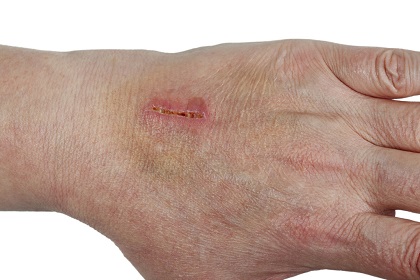Search
What causes a head injury?
A head injury is most often caused by a blow to the head. This may occur from a fall, bicycle injury, sports injury, being struck in the head, or a motor vehicle accident.
What are the symptoms of a head injury?
You may have an open wound, swelling, or bruising on your head. Right after the injury, you may be confused. Symptoms may last anywhere from a few hours to a few weeks. You may have any of the following:
• Mild to moderate headache
• Dizziness or loss of balance
• Nausea or vomiting
• Change in mood, such as feeling restless or irritable
• Trouble thinking, remembering, or concentrating
• Ringing in the ears or neck pain
• Drowsiness or decreased amount of energy
• Trouble sleeping
How is a head injury diagnosed?
• Tell your doctor about your injury and symptoms. The doctor will do an exam to check your brain function. He or she will check how your pupils react to light. He will check your memory, hand grasp, and balance
• You may need a CT scan to check for bleeding or major damage to your skull or brain. You may be given contrast liquid to help the pictures show up better. Tell a doctor if you have ever had an allergic reaction to contrast liquid
How is a head injury treated?
You may be given medicine to decrease pain. Other treatments may depend on how severe your head injury is.
How can I manage my symptoms?
• Rest or do quiet activities for 24 to 48 hours. Limit your time watching TV, using the computer, or doing tasks that require a lot of thinking. Slowly return to your normal activities as directed. Do not play sports or do activities that may cause you to get hit in the head. Ask your doctor when you can return to sports
• Apply ice on your head for 15 to 20 minutes every hour or as directed. Use an ice pack, or put crushed ice in a plastic bag. Cover it with a towel before you apply it to your skin. Ice helps prevent tissue damage and decreases swelling and pain
• Have someone stay with you for 24 hours or as directed. This person can monitor you for complications and call 120. When you are awake the person should ask you a few questions to see if you are thinking clearly. An example would be to ask your name or your address
How can I help prevent another head injury?
• Wear a helmet that fits properly. Do this when you play sports, or ride a bike, scooter, or skateboard. Helmets help decrease your risk of a serious head injury. Talk to your doctor about other ways you can protect yourself if you play sports
• Wear your seat belt every time you are in a car. This helps to decrease your risk for a head injury if you are in a car accident
Call 120 or have someone else call for any of the following:
• You cannot be woken
• You have a seizure
• You stop responding to others or you faint
• You have blurry or double vision
• Your speech becomes slurred or confused
• You have arm or leg weakness, loss of feeling, or new problems with coordination
• Your pupils are larger than usual or one pupil is a different size than the other
• You have blood or clear fluid coming out of your ears or nose
When should I seek immediate care?
• You have repeated or forceful vomiting
• You feel confused
• Your headache gets worse or becomes severe
• You or someone caring for you notices that you are harder to wake than usual
When should I contact my doctor?
• Your symptoms last longer than 6 weeks after the injury
• You have questions or concerns about your condition or care
CARE AGREEMENT:
You have the right to help plan your care. Learn about your health condition and how it may be treated. Discuss treatment options with your caregivers to decide what care you want to receive. You always have the right to refuse treatment.
© 2017 Truven Health Analytics LLC All illustrations and images included in CareNotes® are the copyrighted property of A.D.A.M., Inc. or Truven Health Analytics.
Click the link for more information on Emergency Medicine Clinical Service
Click the link for more information on Surgery Clinical Service











